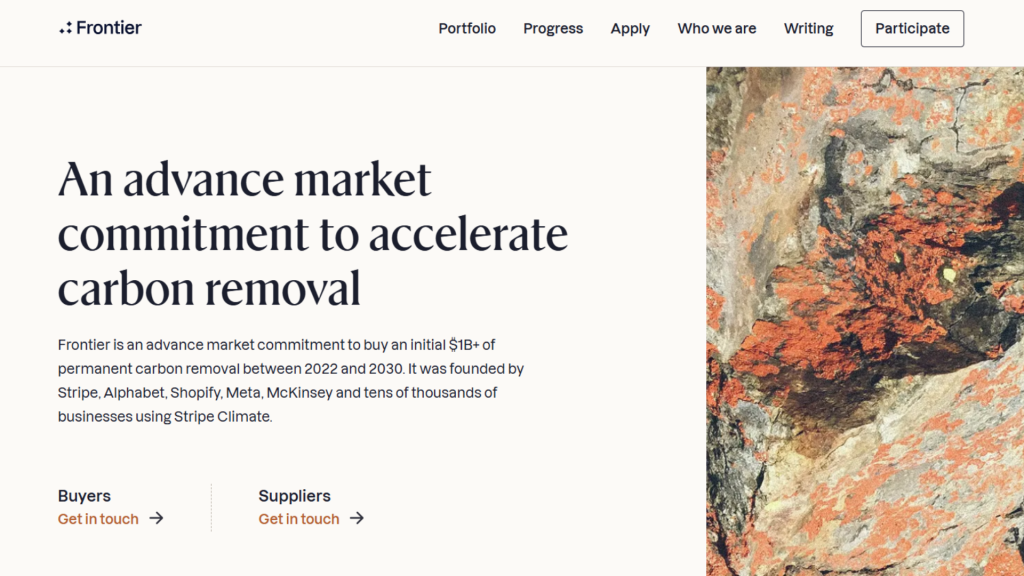Frontier buyers will pay $31.3 million for 115,211 tons of carbon removal via ocean alkalinity enhancement (OAE) between 2026 and 2030.
Planetary’s approach combines rigorous MRV protocols, environmental safeguards, and community engagement to ensure safety and scalability.
OAE delivers dual benefits: durable CO₂ storage and local reversal of ocean acidification, improving conditions for marine ecosystems.
Frontier has signed a $31.3 million offtake agreement with Planetary to expand ocean alkalinity enhancement (OAE) as a large-scale carbon removal solution. Under the deal, Planetary will deliver 115,211 tons of verified carbon removals between 2026 and 2030, marking the next phase of its project following the world’s first verified OAE tons.
Planetary enhances the ocean’s natural carbon removal capacity by dissolving alkaline minerals such as calcium oxide (CaO) or magnesium oxide (MgO) into coastal waters. This process converts dissolved CO₂ into stable bicarbonate ions that remain in the ocean for over 10,000 years. By integrating with existing coastal infrastructure, such as power plant cooling water outfalls, Planetary avoids major new infrastructure costs while scaling impact.
“Ocean alkalinity enhancement can safely and effectively remove CO₂ beyond small-scale trials,” said Mike Kelland, CEO of Planetary. “This approach could be the cheapest and most scalable carbon removal solution. We’re eager to show how it can be rolled out responsibly.”

Frontier’s Head of Deployment, Hannah Bebbington, emphasized the importance of rigorous protocols for scaling. “OAE can remove CO₂ extremely cheaply and efficiently. But expanding it calls for ironclad measurement and safety protocols, alongside addressing community concerns. Planetary is taking on these challenges head on with a rigorous MRV approach and thoughtful community engagement at their Tufts Cove site.”

Planetary’s approach to OAE is designed to hit cost targets below $100 per ton through the use of lower-cost feedstocks and strategic co-location near supply sources. The company has also embedded environmental monitoring at every stage, from feedstock screening to real-time water quality monitoring, with a stop-trigger system if safety thresholds are exceeded.
RELATED ARTICLE: Frontier Commits $1.75M to Advance Ocean Alkalinity and Mineralization Carbon Removal Startups
Alongside climate benefits, OAE supports marine ecosystems by counteracting local ocean acidification—boosting conditions for oysters, lobsters, crabs, and other calcifiers critical to coastal industries and ecosystems. Planetary is also working with Dalhousie University, First Nations, and environmental groups to quantify these benefits.
Indigenous leaders underscored the importance of collaboration. Christopher Googoo, COO of Ulnooweg, said: “This multi-year offtake agreement is an exciting step forward, demonstrating how cutting-edge climate solutions can create opportunities for knowledge sharing, environmental stewardship, and sustainable benefits for our communities and future generations.”

Jim Hepworth of the Confederacy of Mainland Mi’kmaq added: “As Mi’kmaw people, our responsibility to the ocean and environment is rooted in generations of knowledge and care. We’re encouraged to see innovative climate solutions, like those being developed by Planetary, approached with attention to both science and community.”
The offtake purchase was facilitated by Frontier on behalf of its founding members—Stripe, Google, Shopify, and McKinsey Sustainability—along with Autodesk, H&M Group, Workday, and others participating through Watershed.
Follow ESG News on LinkedIn

